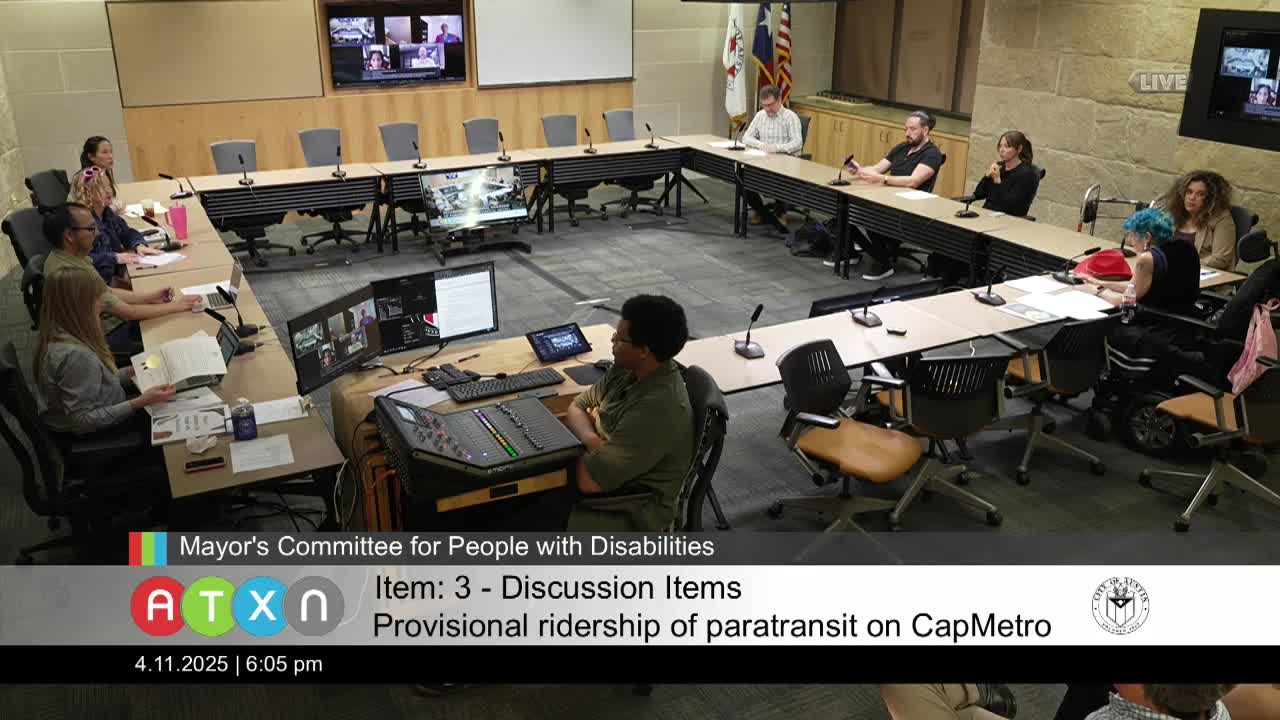Austin users, advocates raise safety and warranty concerns after MetroAccess reclassification
Get AI-powered insights, summaries, and transcripts
Subscribe
Summary
Community members and an advocate urged the Austin Mayor's Committee for People with Disabilities to press Capital Metro/ATP for changes after a recent policy that classifies many mobility-device users as “provisional” riders. Speakers described warranty, safety and service gaps and proposed local pilot programs and peer training.
Deb Miller, a community mobility advocate who identified herself as “Diamond Dev,” told the Austin Mayor’s Committee for People with Disabilities on its April meeting that a Capital Metro/MetroAccess policy now classifies many people who use power wheelchairs as “provisional riders,” which she said creates safety and warranty problems and increases reliance on costly emergency responses.
“The cost they estimated is $50 for each pickup, which is $100 round trip anytime they pick up a wheelchair from anywhere,” Miller said, describing Capital Metro’s per-pickup cost estimate and arguing that current service and warranty rules make independent travel harder for low-income riders.
Miller described several effects she attributes to the policy change: damage or warranty voiding for some power chairs when users roll off sidewalks to reach bus stops; longer waits or missed trips on MetroAccess that left riders stranded overnight; and repeated emergency “lift assists” to the same housing units. She said an individual in her building required an estimated $335,000 a year in pickup costs under the current system, and that a commonly used power chair she referenced costs roughly $22,000. She proposed city-supported services to fix chairs on demand, provide loaner batteries and tires, and a peer-based training and support pilot she called the Blue Apple Express.
Several committee members and public commenters described first-hand transit problems. Rue Johnson, a visually impaired Austin resident, described instances in which bus operators attached restraints to wheelchair wheels rather than secure points, and urged the committee to address fixed-route accessibility and operator training. Committee members asked Miller clarifying questions about what “provisional rider” means; Miller said the MetroAccess eligibility department now factors device brand into classifications and expects many users of electric mobility devices to use fixed-route service except when no other option exists.
Committee members encouraged Miller to share formal proposals in writing and to bring them to Capital Metro advisory bodies. Miller said she had already taken concerns to the Capital Metro advisory committee and to ATP but that she had frequently been unsuccessful in securing fixes. Committee members offered to add the topic to a future agenda and recommended Miller send written proposals to the committee staff for distribution.
The committee did not adopt formal policy changes during the meeting, but members asked staff to place a Capital Metro/ATP update on the May agenda and invited Miller to submit the pilot proposals by email.
